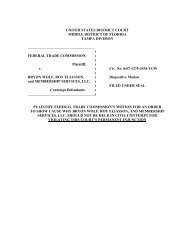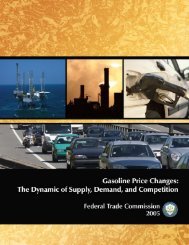Complaint Counsel's Post Trial Brief - Federal Trade Commission
Complaint Counsel's Post Trial Brief - Federal Trade Commission
Complaint Counsel's Post Trial Brief - Federal Trade Commission
Create successful ePaper yourself
Turn your PDF publications into a flip-book with our unique Google optimized e-Paper software.
Respondents' claims are materal because they contain information concerg the purose,<br />
effcacy, and perormance of the DCO Products that would likely affect a consumer's choice to<br />
purchase these products.<br />
IV. THE FTC is NOT VIOLATING THE RESPONDENTS' FIRST AMENDMENT<br />
RIGHTS<br />
A. The Filg of<br />
the Instant Suit Does Not Infringe Respondents' First<br />
Amendment Rights<br />
Thoughout ths proceeding Respondents have argued that their adverising<br />
representations are constitutionally protected religious and political speech that is immune to the<br />
FTC Act's prohibition agaist unfai and deceptive practices. Respondents fist raised their First<br />
Amendment arguent in their Januar 13, 2009 Motion to Dismiss. The Cour dened<br />
Respondents' Motion to Dismiss in its Februar 2,2009, Order, and stated:<br />
The <strong>Complaint</strong> contains suffcient allegations that respondents are engagig in<br />
deceptive commercial speech, including allegations that the Respondents promote<br />
and adverise the Challenged Products, that the Challenged products are offered<br />
for sale at not insignficant prices, and that the adverisements refer to specific<br />
products and attbutes. These allegations, and the content of the exhbits to the<br />
Complait, are more than suffcient for a reasonable fact-fider to infer that the<br />
speech proposes a commercial transaction, refers to specific products and is<br />
economically or commercially motivated. Respondents point to no facts that<br />
would dispute such an inference.<br />
Feb. 2 Order at 8 (citing<br />
In re R.J. Reynolds, 1998 WL 490114, *4 (1998)). The Cour explained<br />
that commercial speech - speech proposing a commercial transaction - that is false or misleading<br />
can be suppressed, and that "(t)he more limted protection accorded commercial speech perits<br />
the FTC to act when necessar to challenge false or deceptive adverising." Feb. 2 Order at 7<br />
(citing<br />
In re R.J. Reynolds, 1998 WL 490114, *4 (1998)).<br />
At tral, Respondents failed to adduce any facts to dispute that their representations<br />
constitute commercial speech. The evidence at tral clearly demonstrated that the challenged<br />
32

















